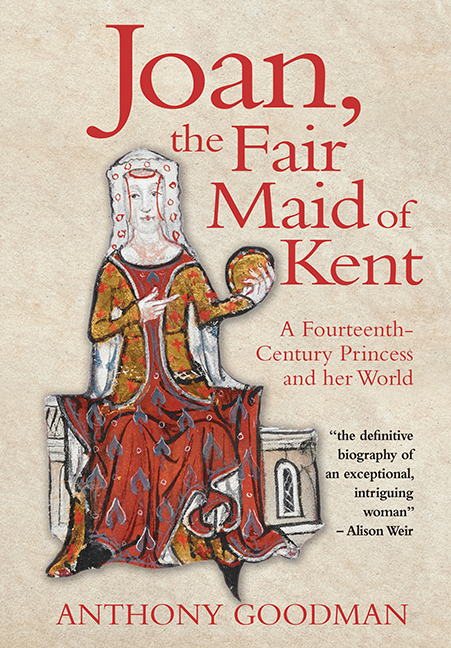Book contents
- Frontmatter
- Dedication
- Contents
- List of Illustrations
- List of Abbreviations
- Maps
- Genealogical Tables
- 1 Loosened Bonds
- 2 Tragic Beginnings
- 3 Bigamy
- 4 Married Bliss
- 5 A Whirlwind Rom
- 6 Princess of Wales and of Aquitaine
- 7 Deaths of Princes
- 8 The King's Mother
- 9 Terrors and Tribulations
- 10 Venus Ascending?
- Notes
- Bibliography
- Acknowledgements
- Index
2 - Tragic Beginnings
Published online by Cambridge University Press: 25 October 2017
- Frontmatter
- Dedication
- Contents
- List of Illustrations
- List of Abbreviations
- Maps
- Genealogical Tables
- 1 Loosened Bonds
- 2 Tragic Beginnings
- 3 Bigamy
- 4 Married Bliss
- 5 A Whirlwind Rom
- 6 Princess of Wales and of Aquitaine
- 7 Deaths of Princes
- 8 The King's Mother
- 9 Terrors and Tribulations
- 10 Venus Ascending?
- Notes
- Bibliography
- Acknowledgements
- Index
Summary
nothing in his life
Became him like the leaving it.
(Macbeth, Act 1 scene 4)JOAN OF KENT'S FATHER Edmund was a victim – due mainly to his lack of political adroitness – of the chronic political instability characterising his half-brother Edward II's reign, which was increased by his deposition and murder in 1327. Though he had been a prime supporter of Edward's overthrow, Edmund soon chafed under the tight control of government exercised by the king's callous widow Queen Isabella and her lover Roger Mortimer during her son Edward III's minority. The couple's sense of the precariousness of their scandalous rule, and their awareness of Edmund's habitual unreliability and current disaffection, made him a potential danger. He was arrested during the parliament held at Winchester in 1330, and accused of treason. Mortimer played a leading role in producing evidence against him, and informed the young king, then ‘at his meat’, of his uncle's conviction. Fearing that Edward would grant Edmund his life, Mortimer and Isabella, without consulting any royal councillors, sent orders in haste to the bailiffs of Winchester to have him executed.1 Hence the specially degrading circumstances of his execution, as the doubtless alarmed citizens scrambled to fulfil their deadly remit.
At first light on a March morning in 1330, it is likely that an expectant crowd gathered outside Winchester Castle. A platform had been erected at its gate for an unprecedented event – the execution for treason of a king's son, of the royal blood of both the Plantagenet kings of England and of the Capetian kings of France. Edmund was the sixth (and third surviving) son of Edward I, by his second wife Margaret, a daughter of Philip III of France and Marie of Brabant. Edward and Margaret already had one son, Thomas of Brotherton. Edmund was born on 5 August 1301, in the royal palace of Woodstock (Oxfordshire).
Accounts of his execution describe especially pitiful circumstances. When he was led out by the bailiffs of Winchester, he was, it was said, clad wretchedly (especially for the time of year) only in his shirt. Both victim and onlookers were for long kept waiting, as an executioner could not be found, perhaps because men shrank from killing a king's son.
- Type
- Chapter
- Information
- Joan, the Fair Maid of KentA Fourteenth-Century Princess and her World, pp. 8 - 21Publisher: Boydell & BrewerPrint publication year: 2017



